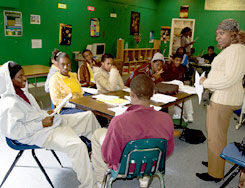How to Build Instruction Around Your Region’s History
Find surprising teaching opportunities for hands-on learning in underresourced areas.
Your content has been saved!
Go to My Saved Content.This how-to article accompanies the feature "Rigor and (Civil) Rights: Helping Mississippi Students See Beyond the Delta."
All teachers can create local, hands-on learning experiences for students, even in underresourced or rural areas. The Freedom Project staff and alumni, in Sunflower County, Mississippi, describe how to draw on the history of your region and find the surprising teaching opportunities there.
Plan a Service-Learning Project Around Real Needs. Greg McCoy, executive director of the Sunflower County Freedom Project, is a big believer in discovery work in any setting.

"Present a problem, issue, or idea and have students reflect on it, problem solve, and come up with their own ideas," McCoy says. Look at neglected areas in your region as potential service projects and learning opportunities. Faded murals can be repainted, and you can reteach the mural's history. An intersection may have many car accidents, and students can write letters advocating for a traffic light.
McCoy recently led students through a business plan for a vacant site in Sunflower County, using math to calculate construction and human resource expenses. Students developed a proposal for a community arts center that would hold classes and house a civil rights tour program, to both capitalize on and inform people about the Mississippi Delta's history. A number of students are now trying to make that business plan a reality.
By visiting the Northwest Regional Educational Laboratory's online tool kit, teachers can get step-by-step instructions on how to identify projects, plan service learning with curriculum, take action, and evaluate projects. The site has lots of online resources, too.
Use Positive -- and Difficult -- History to Inspire Creativity. Help students write a simple script from a book or story based in your region, or even from local legends or tall tales.
Lukendric Washington, a 2007 Freedom Project graduate, recalled that the first play the group performed was written by students in a book group. Students can convert the story to dialogue, develop backgrounds for characters, and assign each other parts to play. Hold performances at your school site for parents, community members, and other classes.
Plan Service Projects That Celebrate Unsung Local Heroes. In 2001, the gravesite in Ruleville, Mississippi, of civil rights activist Fannie Lou Hamer and her husband, Pap, was marked by just a few headstones. The Freedom Project spent a day beautifying the area, planting bushes, shrubs, and a few trees. "I thought it was the least we could do to honor Mrs. Hamer, who is one of the most inspiring figures of the civil rights movement," says Chris Myers Asch, cofounder of the Freedom Project.
Help Students Discover and Utilize Local Lore. Personalize a time in history or a topic relevant to your region by having students conduct oral histories. Freedom Project students conducted interviews about the history of the Delta by talking to known civil rights activists like Charles McLaurin and David Matthews. They talked to community educators, business owners, students, and community elders. You can plan a visit to a retirement or veterans' home, partner with younger or older students, or ask your students to interview a family member. You can find three-day, five-day, and unit-length lesson plans on doing oral history work with your class or after-school program in the Info for Teachers section at the Voice of Witness Web site.
Let Visitors Reinforce Your Message. Seek out special guests to come to your program or classroom. Freedom Project cofounder Chris Myers Asch suggests: "Start with the strengths of your community."
First, he says, think about contacting people who come from or represent your region, who already do work to support it, or who have a special connection to your content area. Politicians, community organizers, librarians, judges, and retired people from any field can have a vested interest in kids, and can inspire them with their stories. Second, write a letter or email, and don't forget to follow up with a phone call if you haven't heard back. "They can't say yes if you don't ask. And if you don't ask, the answer is no," Myers Asch says.
Finally, make it easy for them to fit into your class. One Freedom Project teacher asked famed investigative reporter Jerry Mitchell to speak to her journalism class, and he made the two-hour drive from Jackson to meet with the students. McCoy underlines the importance of visitors emphasizing education, service, and action: "The more that we can bring outside people in here to deliver that message, the more it becomes believable and real to the students."
Most importantly, view every visitor as an opportunity for students to learn. When someone new visits the Freedom Project, class stops and students jot questions down on index cards and ask the visitor about a range of topics, from political predictions to skills needed for different professions to travel experiences. "We can learn from anyone," Myers Asch says.